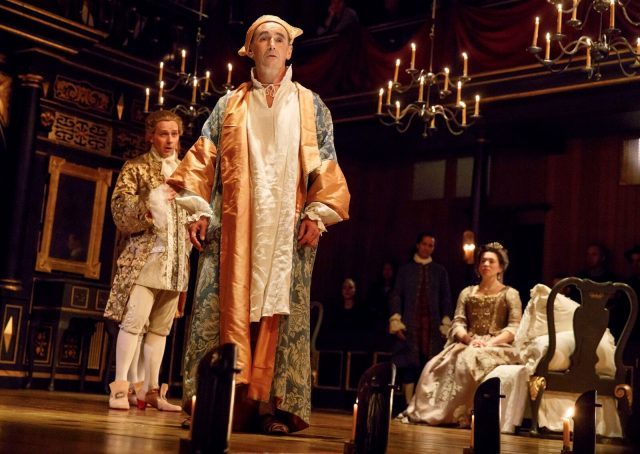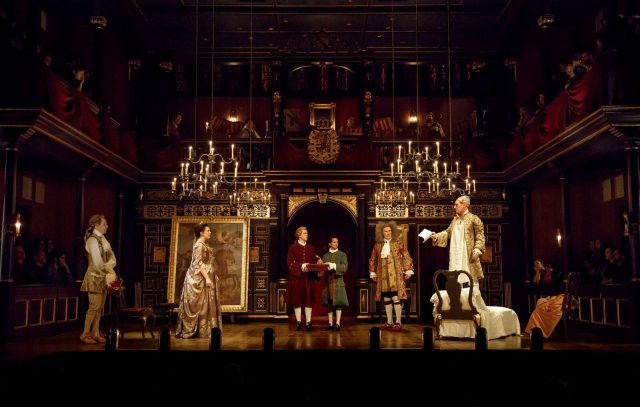
Mark Rylance stars as a world leader teetering on the edge of sanity in Farinelli and the King (photo © Joan Marcus)
Belasco Theatre
111 West 44th St. between Sixth & Seventh Aves.
Tuesday – Saturday through March 25, $32 – $159
www.farinelliandthekingbroadway.com
Over the last few years, British actor Mark Rylance has built up such an impressive resume that he now has a separate Wikipedia page just for all of his nominations and awards, which include an Oscar for Bridge of Spies, an Emmy nod for Wolf Hall, eight Olivier nominations and two wins, and four Tony nominations and three trophies (for Boeing-Boeing, Jerusalem, and Twelfth Night). He is now back on Broadway in Farinelli and the King, a showcase piece written for him by his wife, first-time playwright Claire van Kampen. Also a composer, Van Kampen made her directorial debut last year with Nice Fish, which was written by and starred her husband. Rylance was nominated for an Olivier for his performance in Farinelli as King Philippe V, the grandson of French king Louis XIV who became the Spanish monarch in 1700. The play, originally presented at Shakespeare’s Globe, is staged like the Globe productions of Twelfth Night and Richard III, with some of the audience seated onstage, actors getting into costume onstage and wandering into the audience, candelabras hanging from the ceiling with real candles supplying the majority of the lighting (designed by Paul Russell), and a live band playing baroque instruments in the balcony of designer Jonathan Fensom’s lush set.

Farinelli and the King features a lush, extravagant set by Jonathan Fensom (photo © Joan Marcus)
The show, inspired by the real story of the Spanish king and a famous castrato, takes place in 1737, when Philippe’s unhinged behavior leads his doctor, José Cervi (Huss Garbiya), and chief minister, Don Sebastian De la Cuadra (Edward Peel), to believe he has gone mad and should abdicate the throne. However, Phillippe’s second wife, Isabella Farnese (Melody Grove), is not ready for him to give up the crown. In the opening scene, Philippe is in his pajamas and goofy evening cap, in bed and fishing in a goldfish bowl. “I know I am dreaming and they do not,” he says to the fish, named Diego. “Who would fish out of a goldfish bowl except in a dream! If I were mad, as they think I am, I would be fishing at noon when the sun’s the very devil,” he adds, the first of many references to the sun, moon, and stars. Later, the king, who knows more than he is letting on, gathers together several clocks indicating different times and tells La Cuadra, “You see how time lies? . . . What have you and these clocks got in common? . . . They’re showing me different faces, and I can’t tell which one is true.” When Isabella goes to London and hears the Italian castrato Farinelli (acted by Sam Crane and sung by countertenors Iestyn Davies or James Hall), she brings him back to the Spanish court in the hopes that his magical voice will lessen the king’s ills — which is exactly what happens, angering De la Cuarda. “To hear the king laugh!” Isabella declares. “I had forgotten the sound. How can a human voice change a man’s life?”
Indeed, laughter abounds in the first act, primarily when director John Dove, who has previously collaborated with Rylance and van Kampen on several Shakespeare productions at the Globe, lets Rylance cut loose, muttering under his breath, walking on top of his bed, upping the slapstick, and seemingly ad-libbing at times as some of his fellow actors attempt to hold back giggles. The show’s primary conceit is sensational; whenever Farinelli is going to sing, Crane and the Grammy-winning Davies, whom I saw in the role, both appear onstage; Crane speaks the dialogue, and Davies does the singing, which is simply marvelous. Among the eight arias (seven by Handel, one by Porpora) that lift the spirit at the Belasco Theatre even as the play itself drags are “Se in fiorito” from Giulio Cesare and “Bel contento” from Flavio. But the second act is immediately confounding as the setting moves to the middle of the forest, where the king wants to live, and the cast suddenly recognizes the audience, believing us to be local townspeople there to watch a performance. “Who are they, Isabella?” Philippe asks. “I don’t know,” she replies. “This is turning public. Call it off,” La Cuadra demands, and he’s not wrong. The play doesn’t seem to know how to proceed, leaving the audience confused and itching for the much-swifter pace of the first act. “What are they doing, packed together like that? What do they expect?” Philippe asks Isabella, who answers, “A story. They’ve come for the story.” Philippe concludes, “Well, haven’t we all!” We did come for a story, but not such a convoluted one, which despite being based on fact ends up feeling unconvincing.